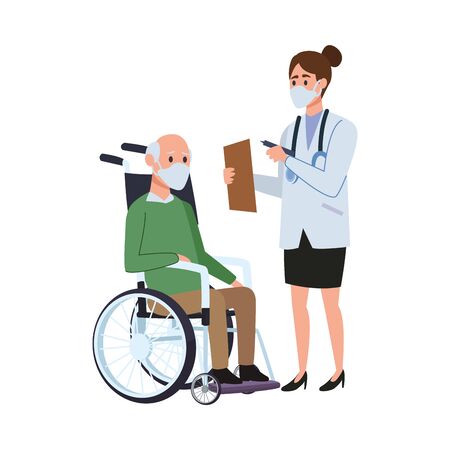Understanding MS and Its Impact on Work
Overview of Multiple Sclerosis (MS)
Multiple Sclerosis, often called MS, is a chronic disease that affects the central nervous system, including the brain and spinal cord. In people with MS, the immune system attacks the protective covering of nerves, which leads to communication problems between the brain and the rest of the body. MS is unpredictable and can vary greatly from person to person.
Common Symptoms of MS
People living with MS may experience a wide range of symptoms. Some symptoms are visible while others may not be noticeable to others but still affect daily life. Here are some common symptoms:
| Physical Symptoms | Cognitive Symptoms | Emotional Symptoms |
|---|---|---|
| Fatigue Muscle weakness Trouble walking Numbness or tingling Spasticity (muscle stiffness) |
Difficulty focusing Memory issues Trouble finding words Slower thinking |
Mood swings Anxiety Depression |
How MS Symptoms Affect Work Life
The symptoms of MS can have a big impact on work life. For example, fatigue can make it hard to keep up with a full-time job or meet deadlines. Muscle weakness or trouble walking may make it challenging to move around an office or perform physical tasks. Cognitive symptoms like memory issues or difficulty focusing can affect productivity and job performance.
Impact on Productivity and Job Performance
Here are some ways that MS symptoms might affect someone at work:
- Reduced stamina: Fatigue may require more breaks or shorter working hours.
- Physical limitations: Trouble moving or muscle stiffness could make some tasks difficult or unsafe.
- Cognitive changes: Memory or concentration issues might slow down work speed or increase errors.
- Mood changes: Anxiety or depression can affect motivation and interactions with coworkers.
Why Understanding These Challenges Matters
Recognizing how MS impacts individuals at work is the first step toward creating supportive environments and finding solutions that help people living with MS maintain their jobs and thrive in their careers. With proper support, many people with MS can continue to work and contribute meaningfully in their chosen fields.
2. Vocational Rehabilitation: Services and Approaches
What Is Vocational Rehabilitation (VR)?
Vocational Rehabilitation, commonly called VR, is a set of services designed to help people with disabilities prepare for, find, or keep a job. For those living with Multiple Sclerosis (MS), VR can provide support in managing the unique challenges that MS may bring in the workplace.
VR Services Available in the U.S.
In the United States, every state offers VR services through government-funded agencies. These agencies work with individuals to create a personalized plan that addresses their specific needs and goals related to employment. Here’s a quick overview of common VR services:
| Service | Description |
|---|---|
| Career Counseling | Guidance on exploring careers that match interests and abilities |
| Job Placement Assistance | Help finding job openings and connecting with employers |
| Skills Training | Classes or training programs to learn new job skills or refresh existing ones |
| Assistive Technology | Access to devices and software that make working easier (e.g., screen readers, voice recognition tools) |
| Workplace Accommodations | Advice and resources for modifying workspaces or schedules to meet individual needs |
| Transportation Support | Assistance getting to and from work if needed due to disability-related challenges |
| Job Coaching | On-the-job support to help adjust to new roles or tasks at work |
| Benefit Counseling | Information on how employment might affect Social Security Disability benefits or health coverage |
Tailored Strategies for People Living with MS
MS symptoms can change over time, so flexible approaches are important. VR counselors work closely with individuals living with MS to develop strategies that help them succeed at work. Some examples include:
- Flexible Work Hours: Adjusting start and end times or allowing part-time schedules during flare-ups.
- Remote Work Options: Setting up home offices with necessary technology for telecommuting.
- Cognitive Supports: Using memory aids, organizers, or note-taking apps for those experiencing “brain fog.”
- Physical Accommodations: Providing ergonomic chairs, standing desks, or accessible restrooms.
- Fatigue Management: Allowing additional breaks or lighter duties during periods of increased fatigue.
- Education for Employers: Offering information sessions about MS so supervisors understand possible symptoms and needed adjustments.
Navigating the VR Process: Step-by-Step Guide
- Contact State VR Agency: Start by reaching out to your local vocational rehabilitation office. You can find contact info online by searching “[your state] vocational rehabilitation.”
- Application & Eligibility Assessment: Complete an application and attend an assessment interview to determine eligibility.
- Create an Individualized Plan for Employment (IPE): Work with a counselor to outline your career goals and the steps needed to achieve them.
- Receive Services: Participate in agreed-upon services such as training, counseling, or assistive tech support.
- Pursue Employment: Use job placement assistance and coaching as you begin working or return to work.
- Ongoing Support: Continue receiving follow-up support as you settle into your job.

3. Legal Rights and Workplace Accommodations
Understanding Your Legal Rights: The ADA and More
The Americans with Disabilities Act (ADA) is a federal law that protects people living with disabilities, including Multiple Sclerosis (MS), from discrimination at work. Under the ADA, employers with 15 or more employees must provide equal opportunities to qualified individuals with disabilities. This means you can’t be fired, demoted, or denied a job just because you have MS, as long as you can do the essential functions of your job—with or without reasonable accommodations.
Key Laws Supporting Employees with MS
| Law | What It Does |
|---|---|
| Americans with Disabilities Act (ADA) | Protects against workplace discrimination and requires reasonable accommodations for employees with disabilities. |
| Family and Medical Leave Act (FMLA) | Allows eligible employees to take up to 12 weeks of unpaid leave per year for medical reasons, including MS treatment or recovery. |
| Rehabilitation Act of 1973 | Applies to federal employees and contractors, offering similar protections as the ADA. |
What Are Reasonable Accommodations?
A “reasonable accommodation” is any change in the work environment or in how a job is usually done that helps someone with a disability perform their job duties. For people living with MS, this could include:
- Flexible work hours or remote work options
- Ergonomic office equipment (special chairs, keyboards, etc.)
- Reserved parking close to the building entrance
- More frequent breaks during the day
- Temperature-controlled workspace (since heat sensitivity is common in MS)
- Written instructions and reminders for tasks
- Modified job duties if certain tasks become too challenging
How to Request Workplace Accommodations
- Know Your Needs: Think about which tasks are difficult because of your MS symptoms and what changes might help you do your best work.
- Talk to Your Employer: You don’t need to share every detail about your diagnosis—just enough to explain why you’re asking for an accommodation. This conversation can start with your supervisor or Human Resources department.
- Put It in Writing: After discussing your needs verbally, it’s helpful to follow up with a written request. You can use email or a formal letter. Be clear about what you’re asking for and why.
- Your Employer Responds: By law, your employer must consider your request and work with you in good faith. They can suggest different solutions if your first idea isn’t possible, but they can’t ignore your request.
- If Issues Arise: If you feel your rights aren’t being respected, organizations like the Job Accommodation Network (JAN) and the Equal Employment Opportunity Commission (EEOC) can help guide you through next steps.
Sample Accommodation Request Email Template
Hello [Supervisor/HR Name],
I am writing to request a workplace accommodation under the ADA due to my medical condition. I am experiencing [describe limitation briefly], and I believe that [describe accommodation] would enable me to continue performing my job effectively.
Thank you for considering my request. I am happy to discuss this further at your convenience.
Sincerely,
[Your Name]
4. Resources and Programs for Employment Support
Finding and keeping a job can be challenging for people living with Multiple Sclerosis (MS), but there are many resources in the United States dedicated to helping. From government services to nonprofit organizations, these programs offer job training, placement, workplace accommodations, and ongoing support. Below, we highlight some of the most helpful options available.
U.S. Government Programs
| Program | Description | How It Helps People with MS |
|---|---|---|
| Vocational Rehabilitation (VR) Services | State-run programs that help people with disabilities find and keep jobs. | Counseling, job training, resume help, interview prep, assistive technology, and workplace accommodations. |
| Ticket to Work Program (Social Security) | A free program for Social Security disability beneficiaries aged 18-64 who want to work. | Job placement, career counseling, vocational rehab, and protection of medical benefits while working. |
| Americans with Disabilities Act (ADA) | Federal law that protects the rights of people with disabilities at work. | Requires employers to provide reasonable accommodations and prohibits discrimination. |
Nonprofit Organizations Supporting People with MS
| Organization | Services Provided | Contact/Website |
|---|---|---|
| National MS Society (NMSS) | Employment counseling, legal resources, webinars on workplace rights, connections to local resources. | nationalmssociety.org |
| MS Focus: Multiple Sclerosis Foundation | Support groups, resource directory for employment assistance, advocacy programs. | msfocus.org |
| Job Accommodation Network (JAN) | Free advice on workplace accommodations and disability employment issues. | askjan.org |
Community Resources and Local Support Groups
Your local community may also offer helpful resources:
- One-Stop Career Centers: Available in every state; they provide job search help, resume building, skills workshops, and more. Find your nearest center at CareerOneStop.org.
- Disability Resource Centers: Many cities have centers offering peer support and employment navigation for people with disabilities including MS.
- Local MS Support Groups: These groups often share information about job openings, accessible employers, and practical advice from others with lived experience.
How to Get Started?
If you are living with MS and want to explore employment opportunities or need support at work:
- Reach out to your state’s Vocational Rehabilitation office;
- Contact the National MS Society for personalized guidance;
- Talk to your healthcare team about your goals—they can connect you to occupational therapists or social workers familiar with MS employment support;
- Explore online resources like JAN for accommodation ideas tailored to your needs.
5. Strategies for Sustainable Employment and Self-Advocacy
Practical Tips for Managing MS at Work
Living with Multiple Sclerosis (MS) presents unique challenges in the workplace, but there are many practical ways to manage symptoms and stay productive. Here are some everyday strategies that can help:
| Challenge | Tip |
|---|---|
| Fatigue | Take short breaks throughout the day, prioritize tasks, and use energy-saving tools or equipment. |
| Mobility Issues | Request ergonomic office furniture, use mobility aids if needed, and keep essential items within easy reach. |
| Cognitive Difficulties | Use reminders, checklists, and digital calendars; break large tasks into smaller steps. |
| Sensitivity to Temperature | Dress in layers, use fans or portable heaters as needed, and ask to adjust your workspace temperature. |
| Vision Problems | Adjust lighting, increase font size on screens, and use screen readers or magnifiers. |
Fostering Open Communication with Employers
Open communication is key to creating a supportive work environment. Here’s how you can approach conversations about MS at work:
- Know Your Rights: Under the Americans with Disabilities Act (ADA), you have the right to reasonable accommodations at work.
- Prepare for the Conversation: Consider what support you need before talking with your supervisor or HR representative.
- Be Honest but Professional: Share only what you’re comfortable with and focus on how accommodations can help you do your job well.
- Create a Plan Together: Work with your employer to identify adjustments that meet both your needs and those of the organization.
- Check In Regularly: Schedule follow-ups to review how things are working and make changes if necessary.
Building Self-Advocacy Skills for Long-Term Success
Self-advocacy means understanding your needs and confidently communicating them. Building these skills can support your long-term career growth:
Ways to Strengthen Self-Advocacy Skills
- Educate Yourself: Learn about MS and workplace rights so you can explain your needs clearly.
- Practice Assertive Communication: Use “I” statements (like “I need…” or “I would benefit from…”) when discussing accommodations.
- Seek Support: Join MS support groups or vocational rehabilitation programs for advice and encouragement.
- Set Career Goals: Think about your strengths and interests—set realistic goals and discuss opportunities for growth with your employer.
- Document Everything: Keep records of meetings, accommodation requests, and any changes made at work.
Your Path Forward
The journey toward sustainable employment with MS is personal. By using practical management strategies, fostering open dialogue with employers, and developing strong self-advocacy skills, people living with MS can thrive in their careers while taking care of their health.

